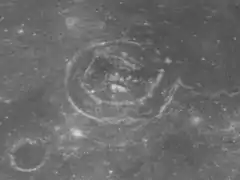Haldane (lunar crater)
Haldane is a lunar impact crater that is located in Mare Smythii, near the eastern limb of the Moon. The visibility of this formation is affected by libration, and even under favorable conditions it is highly foreshortened. It lies just to the west-northwest of the crater Runge, and to the east of Carrillo. The small crater Talbot is immediately to the southwest of Haldane.
 Apollo 16 Mapping Camera image | |
| Coordinates | 1.66°S 84.11°E |
|---|---|
| Diameter | 40.26 km |
| Depth | 0.9 km |
| Colongitude | 277° at sunrise |
| Eponym | J. B. S. Haldane |


The interior of this floor has been flooded by lava, leaving only a low rim projecting up through the lunar mare. This rim is broken along the northwest face, leaving a gap into the interior. In the eastern half of the inner floor is a semi-circular feature that is concentric with the outer wall. There is also a low central ridge offset to the east of the interior midpoint.
Haldane is a somewhat extreme example of many fracture-floored craters in Mare Smythii.[1]
The depth of Haldane is approximately 900 m from the lowest point on the floor of its northwestern quadrant to the highest point on the southwestern part of its outer rim.[2]
References
- Motomaro Shirao, Charles A. Wood, 2011, The Kaguya Lunar Atlas: The Moon in High Resolution, Plate 6: Mare Smythii. Springer Publications
- LTO-81B1 Haldane, Lunar Topographic Orthophotomap (LTO) Series, Defense Mapping Agency, Scale: 1:250,000. 1973.
- Haldane, Gazetteer of Planetary Nomenclature, International Astronomical Union (IAU) Working Group for Planetary System Nomenclature (WGPSN)
- Andersson, L. E.; Whitaker, E. A. (1982). NASA Catalogue of Lunar Nomenclature. NASA RP-1097.
- Blue, Jennifer (July 25, 2007). "Gazetteer of Planetary Nomenclature". USGS. Retrieved 2007-08-05.
- Bussey, B.; Spudis, P. (2004). The Clementine Atlas of the Moon. New York: Cambridge University Press. ISBN 978-0-521-81528-4.
- Cocks, Elijah E.; Cocks, Josiah C. (1995). Who's Who on the Moon: A Biographical Dictionary of Lunar Nomenclature. Tudor Publishers. ISBN 978-0-936389-27-1.
- McDowell, Jonathan (July 15, 2007). "Lunar Nomenclature". Jonathan's Space Report. Retrieved 2007-10-24.
- Menzel, D. H.; Minnaert, M.; Levin, B.; Dollfus, A.; Bell, B. (1971). "Report on Lunar Nomenclature by the Working Group of Commission 17 of the IAU". Space Science Reviews. 12 (2): 136–186. Bibcode:1971SSRv...12..136M. doi:10.1007/BF00171763. S2CID 122125855.
- Moore, Patrick (2001). On the Moon. Sterling Publishing Co. ISBN 978-0-304-35469-6.
- Price, Fred W. (1988). The Moon Observer's Handbook. Cambridge University Press. ISBN 978-0-521-33500-3.
- Rükl, Antonín (1990). Atlas of the Moon. Kalmbach Books. ISBN 978-0-913135-17-4.
- Webb, Rev. T. W. (1962). Celestial Objects for Common Telescopes (6th revised ed.). Dover. ISBN 978-0-486-20917-3.
- Whitaker, Ewen A. (1999). Mapping and Naming the Moon. Cambridge University Press. ISBN 978-0-521-62248-6.
- Wlasuk, Peter T. (2000). Observing the Moon. Springer. ISBN 978-1-85233-193-1.